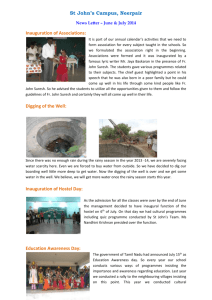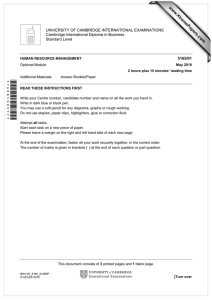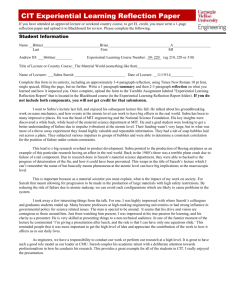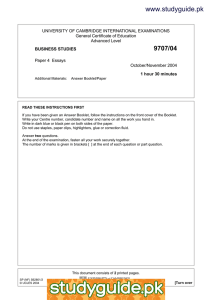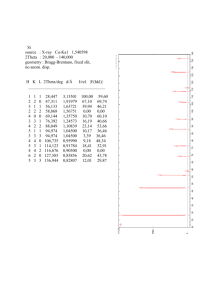www.XtremePapers.com
advertisement
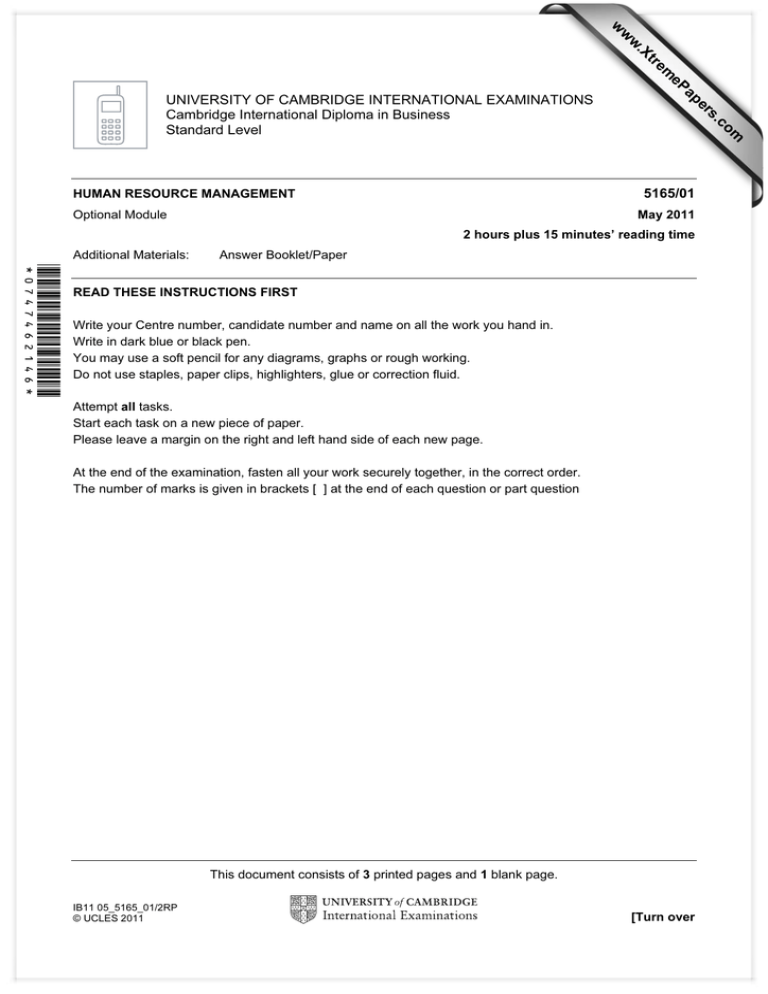
w w ap eP m e tr .X w om .c s er UNIVERSITY OF CAMBRIDGE INTERNATIONAL EXAMINATIONS Cambridge International Diploma in Business Standard Level 5165/01 HUMAN RESOURCE MANAGEMENT Optional Module May 2011 2 hours plus 15 minutes’ reading time Additional Materials: Answer Booklet/Paper *0747462146* *2011* READ THESE INSTRUCTIONS FIRST Write your Centre number, candidate number and name on all the work you hand in. Write in dark blue or black pen. You may use a soft pencil for any diagrams, graphs or rough working. Do not use staples, paper clips, highlighters, glue or correction fluid. Attempt all tasks. Start each task on a new piece of paper. Please leave a margin on the right and left hand side of each new page. At the end of the examination, fasten all your work securely together, in the correct order. The number of marks is given in brackets [ ] at the end of each question or part question This document consists of 3 printed pages and 1 blank page. IB11 05_5165_01/2RP © UCLES 2011 [Turn over 2 You must read the case study below and attempt ALL of the tasks which follow. (This case study is fictitious.) THE FASHION CLOTHING COMPANY (FCC) The Fashion Clothing Company is a small business making fashion clothing items such as shirts, jeans, skirts and blouses. Suresh started the business because his sisters had designed and made clothes for themselves and their friends for many years. He realised their clothes were very popular with the local teenagers and knew that they were a marketable product. The quality of the clothing is so good that he has obtained contracts with a number of fashion retail stores to sell their 5 products. Suresh knows that he is good at managing a business and his sisters design the clothes. He purchases the materials and employs other people to make the clothes which he then sells. The business is a small limited company with his sisters as fellow directors but Suresh is the Chief Executive and effectively runs the business. He has recruited a number of women to make the clothes who are all working from their own 10 homes. Suresh arranges the delivery of materials and patterns and also the collection of completed items. Workers are paid for the number of items they produce and how complicated the item is to make. The quality of the work produced varies between the workers so Suresh has introduced a bonus system for workers who produce high quality work. The better workers are also provided with more work but as there is no proper planning or scheduling of work some of the workers often 15 find that they cannot produce the clothes within the time available, whilst other workers are often left waiting for the next batch of work to arrive. As the work available varies so much most of the workers find that their income fluctuates from week to week. The FCC has become so successful that it now needs to expand. Suresh has purchased a factory and is currently obtaining new machinery and equipment. He now feels that the company cannot 20 rely on the use of home workers and he will need to employ people to work at the factory. The machinery in the factory is very modern and none of the home workers have used such machinery before. The factory lacks basic facilities like a cloakroom/changing facilities, has no washing facilities and only has one toilet. The home workers have all been to a meeting with Suresh where they had a tour of the factory and he discussed future employment with them. 25 At the meeting Suresh explained that the new machines will increase production of the clothes with fewer workers, however he intends to make a few people supervisors to control the quality, but others might lose their jobs. All workers will be provided with training on the machines and will then be taken on as proper employees. They will be paid an hourly rate with a bonus for weekly production over any agreed targets. The workers ask Suresh a number of questions such as 30 whether they can set up a trade union and whether they will receive any other benefits such as paid holidays or company pension. Suresh had not thought about any of these but did agree to a suggestion that a group of workers could meet with him to discuss these and any other issues. Suresh is convinced that the company is growing rapidly and that there will be many new opportunities for employees to improve their skills with the new production technology which will 35 continue to be updated in the future. He also believes that the more able employees will take advantage of increased promotion opportunities as the firm expands. © UCLES 2011 5165/01/M/11 3 You must attempt ALL of the following tasks. Where appropriate use information from the case study to support your answer. 1 (a) Suresh clearly has very little understanding of Human Resource Management (HRM). Define the meaning of HRM. [4] (b) Explain the purpose of using HRM at the FCC. [6] (c) Explain whether Suresh has used the purpose of HRM to manage his home workers efficiently and effectively. [10] [Total: 20] 2 (a) The workers at the FCC have asked if they can join a trade union. List four ways in which a trade union can assist workers. [4 x 1 = 4] (b) Identify which aspects of the legal environment Suresh has not considered properly in setting up the new factory and type of employment. [6] (c) Explain how the training needs of the workers at the FCC will be affected by the proposed changes in technology. [10] [Total: 20] 3 (a) The FCC will now have to introduce more formal procedures for selecting staff. List four elements of the selection process. [4 x 1 = 4] (b) (i) Identify four ways in which contracts can be terminated. (ii) [4 x 1 = 4] Recommend which method would be most appropriate for the FCC for the home workers who are no longer required. [2] (c) Explain the difference between the contractual arrangements used for the home workers and those likely to be used by the FCC in the factory. [10] [Total: 20] 4 (a) The FCC have no system for measuring performance. List four methods of measuring or monitoring people’s performance at work. [4 x 1 = 4] (b) Explain how an appraisal system might work at the FCC. [6] (c) Evaluate the type of systems that could be set up at the FCC to negotiate and discuss the issues raised at the meeting called by Suresh. [10] [Total: 20] 5 (a) The FCC workers have asked whether any fringe benefits will be available. List four fringe benefits that a company may use. [4 x 1 = 4] (b) Explain how the FCC might motivate its workers so that output and quality can be improved in the new factory. [6] (c) Explain what types of training Suresh would have to put into place to ensure that his workers are able to use the new technology and keep up to date. [10] [Total: 20] © UCLES 2011 5165/01/M/11 4 BLANK PAGE Permission to reproduce items where third-party owned material protected by copyright is included has been sought and cleared where possible. Every reasonable effort has been made by the publisher (UCLES) to trace copyright holders, but if any items requiring clearance have unwittingly been included, the publisher will be pleased to make amends at the earliest possible opportunity. University of Cambridge International Examinations is part of the Cambridge Assessment Group. Cambridge Assessment is the brand name of University of Cambridge Local Examinations Syndicate (UCLES), which is itself a department of the University of Cambridge. © UCLES 2011 5165/01/M/11
